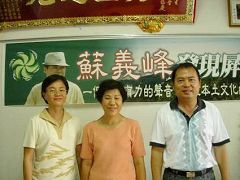Taiwan: Pingtung County Council Members Pay Attention to CCP’s Illegal Organ Harvest (Photo)
(Clearwisdom.net) Pingtung County Council Member Su I-feng held talks with Falun Gong practitioners on June 28, 2006, to discuss how to have more people in Taiwan learn about the Chinese Communist Party's (CCP) atrocities of illegal harvesting of organs from living Falun Gong practitioners for profit.
| Pingtung County Council Member Su I-feng (first from right) meets Falun Gong practitioners to learn about the CCP’s atrocities in the illegal organ trade |
Mr. Su said he knew that many Taiwanese people receive organ transplants in Mainland China. The whole world was shocked after three witnesses disclosed the CCP’s practice of removing organs from living people, and Dr. Wenyi Wang’s shouting in front of the White House during the welcome ceremony for Hu Jintao’s visit, to demand an end to the persecution. Mr. Su worried about those Taiwanese people receiving organ transplants in China and the degradation of Taiwan’s ethics and morality due to the CCP’s inhumane atrocities.
Mr. Su suggested having a seminar on organ transplantation and safety, to motivate all circles in Taiwan to discuss the issue. He thought that the Taiwanese public should know this information and make their own judgment.
Mr. Su called on medical units and organization to inform all medical personnel not to violate the law concerning organ transplants. Based on item 18 of the Organ Transplantation Act, those people spreading or advertising organ trade information via publications, magazines, radio broadcast, TV, computer or other media will be fined for TWD 90,000-450,000.
On June 23, 2006, the Pingtung County Council passed a resolution condemning the CCP’s persecution of Falun Gong practitioners and the CCP’s crimes in the organ trade. The resolution requested the United Nations and international human rights organizations to send investigation teams to China to investigate the CCP regime’s illegal organ harvesting and trade. It also advised the Taiwanese people not to go to China for illegal organ transplants, in order to safeguard Falun Gong practitioners’ basic human rights and freedom of belief.
